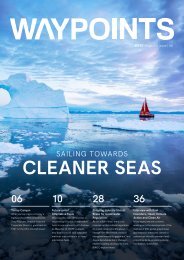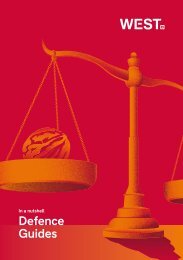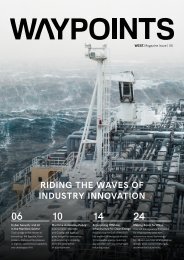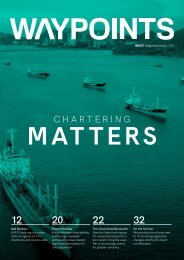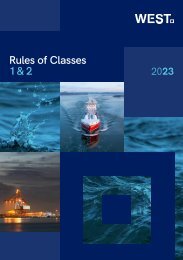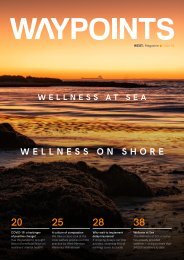Waypoints: Under Attack
Our launch issue is a cyber-themed special which examines the constant and ever-increasing threat of cyber exposures, and suggests measures by which maritime organisations can mitigate the potential damage to their business. Also included are features on the impact of the pandemic upon seafarers; the encouraging role played by big data within the shipping industry; what can be done to prevent tanker explosions; the advantages offered by electronic bills of lading; plus the first of our regular profiles of West offices in different territories, as well as a round-up of current legal cases.
Our launch issue is a cyber-themed special which examines the constant and ever-increasing threat of cyber exposures, and suggests measures by which maritime organisations can mitigate the potential damage to their business. Also included are features on the impact of the pandemic upon seafarers; the encouraging role played by big data within the shipping industry; what can be done to prevent tanker explosions; the advantages offered by electronic bills of lading; plus the first of our regular profiles of West offices in different territories, as well as a round-up of current legal cases.
You also want an ePaper? Increase the reach of your titles
YUMPU automatically turns print PDFs into web optimized ePapers that Google loves.
28 Issue 01 WAYPOINTS<br />
WAYPOINTS Issue 01 29<br />
Asset tracing<br />
Port operations<br />
Asset tracing represents the other side<br />
of the due diligence equation. In these<br />
instances, we’re hunting for information<br />
and identifying assets for seizure if a<br />
counterparty has incurred a debt to our<br />
client and has failed to meet that debt. In<br />
some cases, securing such assets will be<br />
undertaken to satisfy a legal judgement.<br />
In a recent example, one of our shipowner<br />
clients had nine ships on charter to<br />
a Singapore-based charterer, with<br />
a substantial sum of hire owed. The<br />
charterer in question refused to pay,<br />
terminating all communication. We were<br />
able to trace the shareholder interests<br />
to another company and establish a<br />
connection. Bank accounts were duly<br />
identified and blocked, and bunkers were<br />
seized. As a result, the owner’s claim<br />
for the undisputed sums was satisfied.<br />
Incidents<br />
Here we investigate personal injury claims<br />
or examples of criminal activity. It’s not<br />
unknown for crew members or passengers<br />
to essentially lie about injuries that may or<br />
may not have happened on board.<br />
Obviously, such incidents do occur; people<br />
do fall over, damage their backs or suffer<br />
other injuries. Our job is to find out whether<br />
claimants are telling the truth and, if so,<br />
to ascertain the severity of their injuries<br />
or illnesses. This sometimes has to be<br />
done covertly; we need to observe people<br />
without them knowing, because if they<br />
are engaged in a fraud they’ll tend to give<br />
themselves away at some point, perhaps by<br />
suddenly being able to walk without a stick<br />
when they think they’re not being observed.<br />
We are often called upon to examine<br />
port facilities or specific conditions which<br />
have been blamed for causing vessel<br />
delays or other shipboard issues. We<br />
recently investigated the facilities at a<br />
West African port when a client’s ship<br />
was delayed for a month, losing money<br />
while waiting to be loaded. The reason<br />
given was that a conveyor had broken<br />
down and was unserviceable. This part<br />
was true, but we found that there were<br />
two others in the port being used by<br />
other ships during that month. The<br />
shipowner’s claim for the delay was<br />
duly settled as a result of the<br />
information we found.<br />
Sanctions<br />
Initiatives like the U.S. Government’s<br />
Maritime Advisory system make it clear<br />
that the sanctions regulators expect<br />
all parties in the maritime sphere to<br />
implement a compliance programme<br />
that ensures they are not engaging, even<br />
unwittingly, in sanctioned activity. That<br />
means things like looking at the AIS and<br />
trading history of ships, the origin of<br />
cargoes being offered and the bona-fides<br />
of new clients. The penalties for being<br />
involved in a breach of sanctions are<br />
severe – perhaps even business-fatal –<br />
so taking prudent steps to protect your<br />
business is vital.<br />
We can help. Our sanctions service<br />
uses a wide variety of intelligence and<br />
investigative tools to look at whether<br />
ships have gone somewhere they shouldn’t,<br />
or transported cargo they shouldn’t be<br />
carrying. When ships ’go dark‘, it’s our<br />
service that will track those ships, find<br />
out what they were doing while they<br />
were ‘dark’ and then advise our clients<br />
about the risk profile of a particular activity<br />
or business being offered. One example<br />
of a potential case concerned a vessel<br />
which ‘went dark’ near Oman/Iran for<br />
reasons unknown. There were concerns<br />
that the vessel in question was smuggling<br />
Iranian oil, but our analysis showed that<br />
the break in broadcasts was partly down<br />
to shore-based AIS receivers being faulty<br />
during certain time periods, so we were able<br />
to confirm that the vessel hadn’t sneaked<br />
across the waters to Iran after all.<br />
These services are all internationally<br />
available round the clock, thanks to the<br />
West/CSolutions office network and our<br />
connections with worldwide authorities,<br />
and can be supplied on a case-by-case<br />
or retainer basis.<br />
Click here for more information<br />
on Qwest Forensics<br />
We are also able to closely examine the<br />
circumstances surrounding the very sad<br />
(though thankfully rare) occasions when<br />
a person goes overboard.<br />
Phil Butler<br />
Qwest Forensics,<br />
Qwest<br />
E Phil.Butler@qwestmaritime.com<br />
A police officer for 30 years, Phil belongs to<br />
the UN Expert Group on Fraud. He now uses<br />
his specialist skills to assist shipowners,<br />
insurers and lawyers in commercial disputes.<br />
Smuggling and stowaway issues come<br />
under this heading as well. Shipowners<br />
often become mired in legalities following<br />
a smuggling incident, so we’ll work out<br />
precisely what happened and where any<br />
blame might lie.<br />
Qwest brings together the insurance expertise of the West of England<br />
and the innovative legal and consultancy skills of C Solutions to offer<br />
the maritime industry a suite of tailored products to cover any legal<br />
and financial needs not covered by traditional P&I cover.




